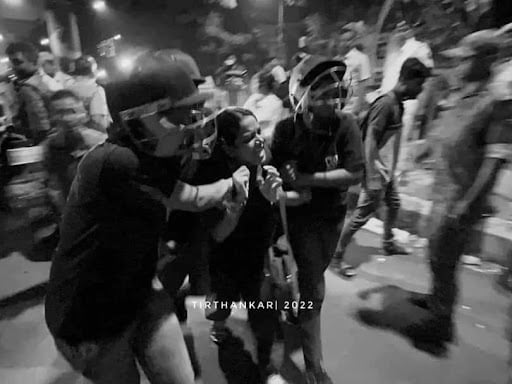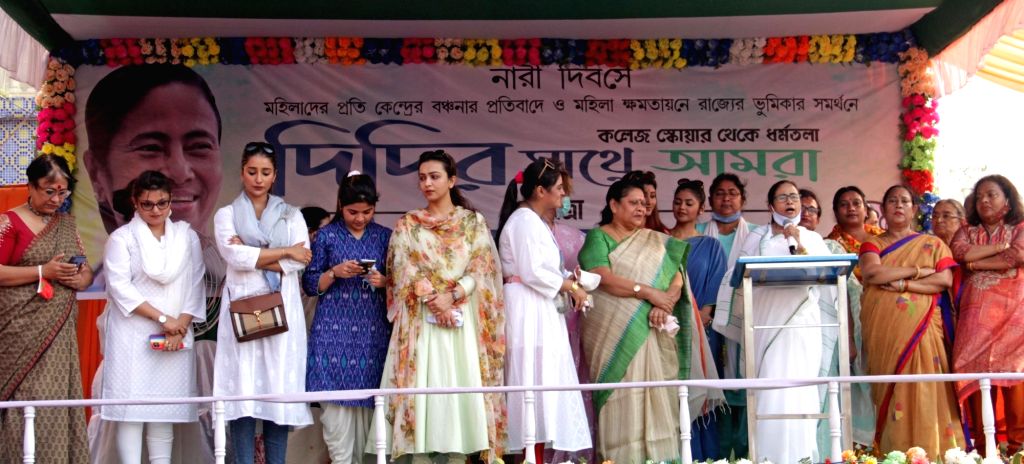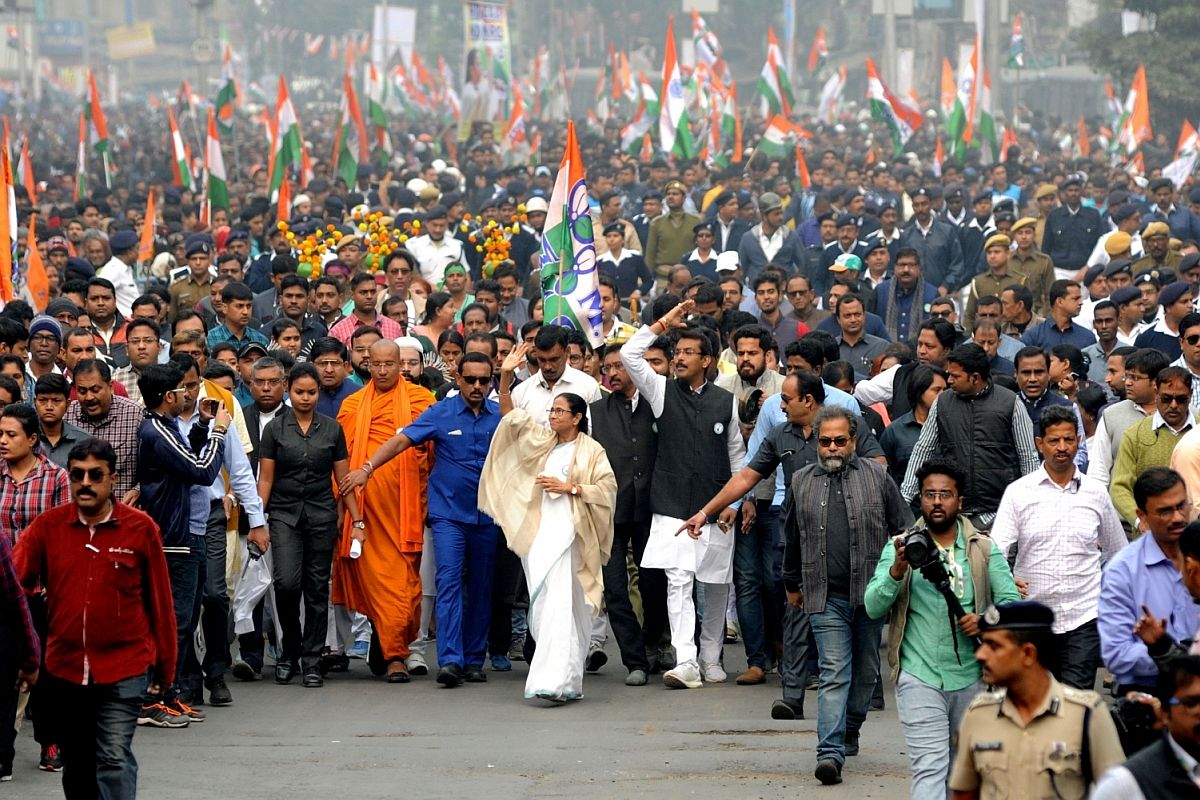In the earliest hours of 21st of October, 2022, Kolkata witnessed a crackdown upon protestors who were sitting on an indefinite hunger strike outside the office of the West Bengal Board for Primary Education, the body responsible for the TET exams which has to be cleared for the selection of primary teachers in Government schools across West Bengal.
The growing intolerance towards public opinion which is democratically presented or increasing violence against the opposition since the TMC was re-elected into power on the 2nd of May, 2021, has been expressed through various means, most notable of them being the changing attitude of the police towards citizens and female protesters in particular.
Over the last few months the TMC government has found itself in an embarrassing situation after CM Mamata Banerjee’s close associate and former Education Minister Partha Chatterjee found himself facing the Enforcement Directorate’s interrogation after nearly 50 crores worth of cash and 70 lakhs worth of gold was found in properties linked to him and his close associates. He is currently under CBI custody while the Teacher Recruitment scam continues to unfold through further investigations. Earlier this month TMC MLA, Manik Bhattacharya was also arrested by the Enforcement Directorate (ED) for his involvement with this recruitment scam.
It is important to note that this is an ongoing case whereby, the High Court has directed, “In our opinion, under normal circumstances, it would not be appropriate to straight away direct CBI investigation in a recruitment-related controversy unless the allegations are so outrageous and the perpetrators of the alleged offences are so powerful that investigation by the state police would be ineffectual. But considering the submission of counsel for the CBI and the fact that investigation by the said agency has substantially progressed, we do not want to stall such investigation at this stage and wait to see if the state police can carry on the same investigation impartially.” Various RTIs have revealed that of the 20000 posts advertised only about 13000 were filled and no merit list was ever published, instead, the selected candidates were informed through SMS.
Also read: Sexual Abuse Of Women In Protests: The Price Paid For The ‘Sanctity’ Of The Movement
On the 18th of October, 2022 around 500 of these candidates sat down for an indefinite hunger strike outside the office of West Bengal Board of Primary Education. On October 20th which was incidentally day 3 of the indefinite hunger strike by the anti-TET scam protestors, Nadia MLA, Manik Bhattacharya’s plea against his arrest for non-co-operation with the investigation, was dismissed by the bench of Justices, Aniruddha Bose and Vikram Nath. This case has triggered citizens across West Bengal to question the transparency of the TMC led state government. However, the state government’s actions in retaliation of the protesting public has also received significant criticism and for all the right reasons.

The growing intolerance towards public opinion which is democratically presented or increasing violence against the opposition since the TMC was re-elected into power on the 2nd of May, 2021, has been expressed through various means, most notable of them being the changing attitude of the police towards female protesting citizens and citizens in general. In India, activists have certain basic rights extended to them. Foremost of them being that they must be allowed to take out peaceful rallies in the presence of the police, women cannot be manhandled or touched or even interrogated without the presence of a woman by a male officer and women cannot be arrested between sundown and sunrise.
Also read: The ‘Frustrated’ Indian Politics: Patriarchy’s Need To Control Women’s Bodies
In the wee hours of the 21st of October, 2022, a violation of all of these is exactly what happened. Images of women being grabbed, pulled and violently shoved around into police vans went viral on social media platforms. The police had been issuing warnings for over a day to the protestors to remove themselves from the site of protest. This is also not the first time that there is a standoff between the Teachers and the State. Earlier this month around the time of Durga Puja which has been celebrated with extra festivities (carnival) by the state government this year since it received the UNESCO acceptance for intangible cultural heritage, the police evicted protestors from their site near the Mahatma Gandhi Statue in the Red Road area after 573 days of their sit-in protest.
This protest by the TET 2014 candidates and primary teachers who have had to deal with the SSC scam is a fairly old one. This case is a long winding one which has seen a number of twists and turns during its course but the most outrageous actions went down on the 21st of October, 2022. Actions that led citizens of West Bengal to look back upon this reign and ponder upon similar moments of audacity by the state and its police machinery.

A section of students and citizens have pointed out how there are similarities with the incidents that led up to the Hok Kolorob movement. Hok Kolorob was triggered by similar events during the earliest hours of 17th of September, 2014 when the police entered Jadavpur University and lathicharged protesting students who were demanding a fair investigation into a case of sexual assault within the campus. The incident led to public outcry against the actions by the police and by the first half of 2015 the erstwhile VC of Jadavpur University Abhijit Chakrabarti had resigned.
In both incidents the police acted during the middle of the night with violence and manhandled female protestors. The police working under the state government have in a number of scenarios violated basic human rights that have been constitutionally assured in the interests of ‘acting according to their orders’. Since their re-election for a third term on the 2nd of May there have been a number of stray incidents in and around Kolkata where female protestors of various organisations including All India Student’s Association (AISA) and Progressive Democratic Students Front (PDSF) have been detained and verbally and physically abused within police custody before being released back since no charges could be brought against them. In most of these cases they were protesting against the state government’s excesses in various areas or the unlawful detention of their own comrades.
Also read: An Analysis of India’s Different Approaches To Women’s Issues From A Policy Lens
If the constitutional assurances are anything to go by and the images from 21st of October have to be taken seriously one can only infer that the police force under the TMC government has grown more intolerant and is open to violating human rights in an unconstitutional manner. The growing intolerance of the TMC government towards any opposition has revealed itself in a surprisingly patriarchal manner where women’s bodies have often become the site of violence. It was an established fact that the BJP does resort to similar human rights violations but for a party which has Saket Gokhale and Mahua Moitra for spokespersons, this is quite unexpected.
CM Mamata Banerjee led TMC government has often found itself in the mud when it came to gender politics. The hypocrisy of their policy vs action is clearly laid out for all to see. Mamata Banerjee and her followers publicly shamed and blamed the survivor in the Park Street gangrape case in order to protect their friends from defamation and legal action. Back in 2014, Tapas Pal a TMC MP has levelled open rape threats against CPIM member’s families. In that case Mamata Banerjee washed her hands off the comments by announcing that she does not endorse the comments. On one hand the policies that Mamata Banerjee has enacted like the Kanyshree Prakalpa, Sikhasree Prakalpa, Rupashree Prakalpa and Sabooj Sathi have been somewhat successful as women centric welfare development moves, on the other hand the violence against women when they dare to stand up against the actions or irregularities of the state have been quite visible as well.

However, the success of these welfare initiatives is well debated since the financing of secondary schooling has not translated into mass college level and university level admission and neither has that translated into the girls being able to join the job market after acquiring degrees. Debdutta Chowdhury an Assistant Professor in Gender studies, at the Centre for Studies in Social Sciences, Kolkata, has previously mentioned in an interview, in 2021, “A government policy should be assessed based on its sustainability and not on its immediate outcome. They (women centric policies) are more populist in nature and might not have the desired outcome.” The agency of the girls with respect to the fellowship money being spent in their families has been widely questioned.
All of this points towards an attempt towards gaining immediate popularity as opposed to a well thought and planned social welfare initiative. In the face of this when dissenting citizens choose to democratically express their opposition, they are shut down violently. The larger attitude of the government appears to be one defined by values of charitable intent which allows no space for democratic dissent to be heard.
Feminist politics fundamentally allows dissent to be democratically heard and more importantly understands that equity and equality are different in spirit and have to be achieved through more than token welfare schemes. Women-led politics would not make much of a difference if the language of politics does not change from masculine, power-oriented actions to empathetic, democratic and dissent accepting actions.
The message is simple, ‘fall in line with the welfare schemes that exist and do not ask questions, if you do, we are no longer responsible for your well-being.’ This hyper-projection of a women-led economy and women-led politics has completely brushed under the carpet dissent and logical counter arguments made by various opposing groups. Interestingly, Mamata Banerjee’s own career has seen her be an activist whose dissent was heard loud enough and supported by thousands in the face of a 34 year CPIM led rule. For someone who came into power because her dissent was given democratic space to snowball into her growth as a leader, Mamata Banerjee does not seem to be able to understand that democratic tolerance is a two-way street. Through her silence which enables the police to carry out unspeakable atrocities, only some of which ever get caught on camera, she is directly lending her support to the shrinking of democratic space in West Bengal.
This is a matter of extreme concern as she has been projected in National Politics as a forerunner of the uniting opposition to the BJP led government which has rightly faced the criticism levelled against its actions. Public intellectuals opposed to the BJP regime have chosen to place their faith in her yet so many of her actions in West Bengal indicate that she might just end up being more of the same if not worse when or if she comes to power.
For a leadership that claims that they are women-centric and believe in welfare and positive action, the TMC should have ideally shown the way for acceptance of dissent and democratic opposition, an act they have utterly failed in. It is important to note that this shift from tolerance to intolerance is a fairly new/developing one. In the past there have been incidences where movements and the sea of people were allowed their opinion and their voices were heard by this same government. Whether any action came of it may be debatable but the complete shutdown of dissent is a more recent development in West Bengal.

Calls of her resignation have already begun amongst the opposition and the incidence of Teachers being violated by the police has not gone down very well in any version of public memory in West Bengal. In the last year incidences of violence against women protesting at the Deucha Pachami site, have been reported and none of this is adding up to an image of hope or non-violent democratic political actions in the future. It appears that in many ways, Mamata Banerjee, through her actions, has chosen to cut off access to the table once she got to it. Her early moves during her reign have proven to be mere tokens of support and empathy with the women in her state. In her later years she has chosen to change her strategy to not allow dissent against herself or her close associates.
She is increasingly acting in order to sort out interests of her own close aides rather than in service of the people she claims to be the democratically elected leader of. She might n her public statements disagree with this claim but her actions prove otherwise. Feminist politics and women-led politics is clearly not the same thing. Feminist politics fundamentally allows dissent to be democratically heard and more importantly understands that equity and equality are different in spirit and have to be achieved through more than token welfare schemes. Women-led politics would not make much of a difference if the language of politics does not change from masculine, power-oriented actions to empathetic, democratic and dissent accepting actions.
Also read: BJP’s Cabinet Reshuffle: More Women Leaders Does Not Mean Empowerment
This is where the TMC led Mamata Banerjee is gradually moving away from the brief it initially started out with its governance from. Whether the TMC chooses to accept the consequences of their actions is something that only time will tell. But about one thing we can be absolutely certain, the TMC no longer enjoys the same popular support it did a decade or even half a decade ago. The number of naysayers have been growing exponentially and it probably has everything to do with their incapability and failing governance.
References
- TET 2014 qualified candidates on hunger strike in Kolkata, demand immediate recruitment, Edex Live
- Bengal teachers’ recruitment scam: Big lessons from a ‘scam’ full of names, Economic Times
- W.B. teacher recruitment: Supreme Court dismisses TMC MLA Manik Bhattacharya’s plea against arrest, The Hindu
- ‘TET-qualified’ candidates in Bengal stage indefinite sit-in, hunger strike seeking jobs, The Print
- In Birbhum, protest against Deucha Pachami coal project smoulders: ‘Won’t give up land or way of life’, Indian Express
About the author(s)
Utsarjana Mutsuddi, is a PhD Research Scholar working in the broader area of Cultural Studies with a focus on Performance, Cultural Texts and Indigenous Studies. She loves to write, create, cook and dream.




